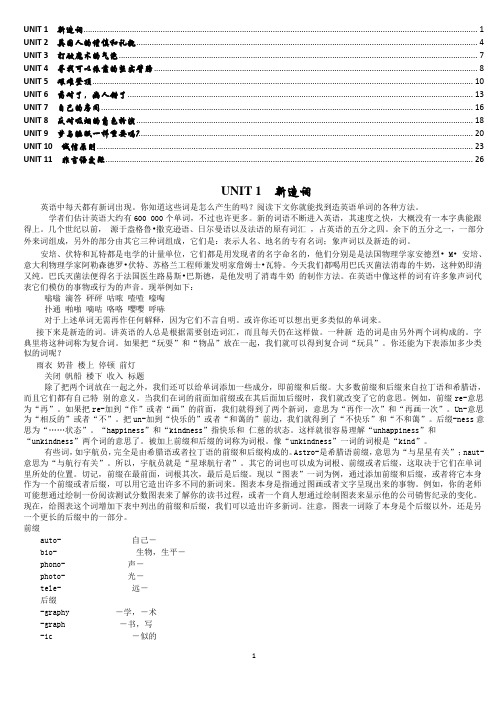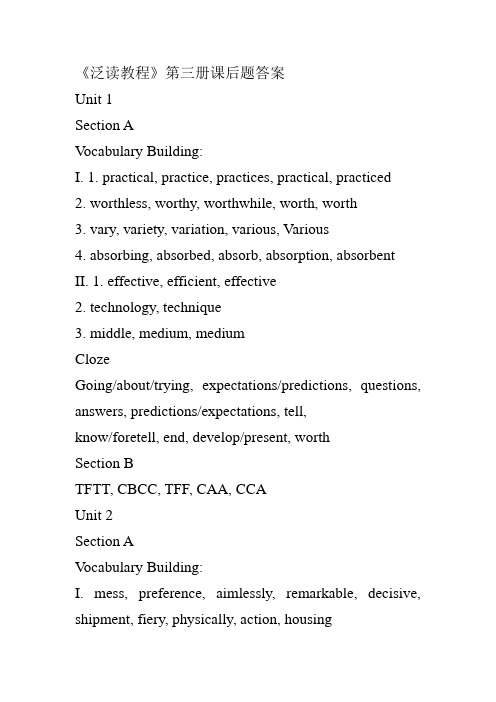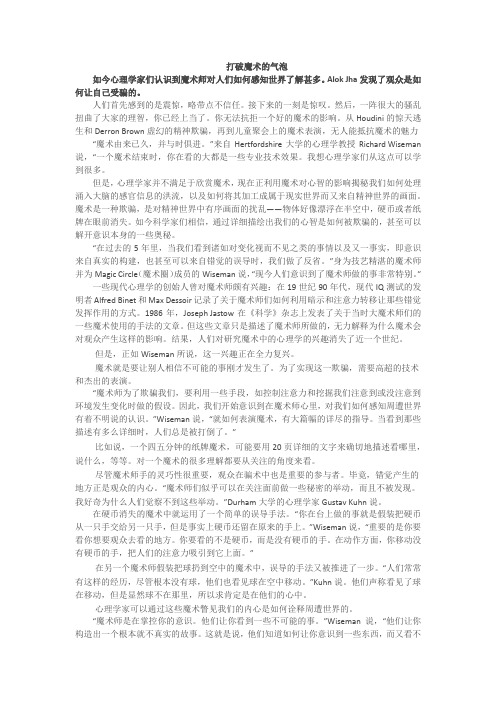27036 英语泛读三
英语泛读教程3课文翻译

UNIT 1 新造词 (1)UNIT 2 英国人的谨慎和礼貌 (4)UNIT 3 打破魔术的气泡 (7)UNIT 4 寻找可以依靠的坚实臂膀 (8)UNIT 5 艰难登顶 (10)UNIT 6 药对了,病人错了 (13)UNIT 7自己的房间 (16)UNIT 8 反对吸烟的角色扮演 (18)UNIT 9 梦与睡眠一样重要吗? (20)UNIT 10 诚信原则 (23)UNIT 11 非言语交际 (26)UNIT 1新造词英语中每天都有新词出现。
你知道这些词是怎么产生的吗?阅读下文你就能找到造英语单词的各种方法。
学者们估计英语大约有600 000个单词,不过也许更多。
新的词语不断进入英语,其速度之快,大概没有一本字典能跟得上。
几个世纪以前,源于盎格鲁•撒克逊语、日尔曼语以及法语的原有词汇,占英语的五分之四。
余下的五分之一,一部分外来词组成,另外的部分由其它三种词组成,它们是:表示人名、地名的专有名词;象声词以及新造的词。
安培、伏特和瓦特都是电学的计量单位,它们都是用发现者的名字命名的,他们分别是是法国物理学家安德烈• M•安培、意大利物理学家阿勒森德罗•伏特、苏格兰工程师兼发明家詹姆士•瓦特。
今天我们都喝用巴氏灭菌法消毒的牛奶,这种奶即清又纯。
巴氏灭菌法便得名于法国医生路易斯•巴斯德,是他发明了消毒牛奶的制作方法。
在英语中像这样的词有许多象声词代表它们模仿的事物或行为的声音。
现举例如下:嗡嗡滴答砰砰咕哝喳喳嚎啕扑通啪啪嘀咕咯咯嘤嘤呼哧对于上述单词无需再作任何解释,因为它们不言自明。
或许你还可以想出更多类似的单词来。
接下来是新造的词。
讲英语的人总是根据需要创造词汇,而且每天仍在这样做。
一种新造的词是由另外两个词构成的。
字典里将这种词称为复合词。
如果把“玩耍”和“物品”放在一起,我们就可以得到复合词“玩具”。
你还能为下表添加多少类似的词呢?雨衣奶昔楼上停顿前灯关闭帆船楼下收入标题除了把两个词放在一起之外,我们还可以给单词添加一些成分,即前缀和后缀。
自考27036英语泛读三-自己整理

Complete the following sentences with words or phrases from this lessonUnit 1 University and Their Functionelicit:引出,抽出 acquisition: 取得,获得 hamper: 阻碍 consistent with: 与…一致temperate: 温和的 assertion: 断言,主张 in obedience to : 遵从feeble: 虚弱的 construe: 分析,解释 impart: 给予,传授1.It is often the case that the truth can be elicited through discussion.这是常有的事,真相可以通过讨论引发。
2.The parents are amazed at the kid’s acquisition of self-control in the matterof fear. 父母对孩子通过害怕的事情获得自控能力感到惊讶。
3.Like other branches of science, history is now encumbered and hampered by itsown mass.像其他科学分支一样,历史由于自身原因对现在产生了很多妨碍和阻碍。
4.This statement is not consistent with what the chairman has announced at themeeting.这个声明和主席在会议上宣布的不一致。
5.If you had remained calm, the discussion might have been more temperate.如果你保持冷静,讨论可能更像样。
6.He repeated his assertion that it was his father who has deserted the family.他重述他的声明是他父亲抛弃了家庭。
英语泛读教程3第三版(刘乃银编)平台答案(含cloze和extrapassage)

Unit 1Text: ExercisesA: cB.D.Fast readingHome Reading8. bCloze11.going/about/trying 2.expectations/predictions 3.questions4.answers 5.predictions/expectations 6.Tell7.know/foretell 8.develop/present 9.worthExtra Passage 1 Key:BBCA Unit 2Text: ExercisesA: bB.D.Fast readingHome Reading8. bCloze 21. communicate2. ways.3. using4. of5. Message6. meet7. causes8. Meanings9. to10. eyesExtra Passage 2 Key: ADBCB Unit 3Text: ExercisesA: dB.D.Fast readingHome Reading8. dCloze31.poor2.habits3.Lies4.little5.Unfortunately6.what7.slows8.one reads.9.than10.Comprehension11.cover Extra Passage 3 Key: DBABA Unit 4Text: ExercisesA: cB.D. Fast reading Home ReadingCloze 41.studied2.Satisfaction3.reduced4.reported5.whose6.published7.on8.such9.illustrate/show/indicate10.contributionsExtra Passage 4 Key: ADDBUnit 5Text: ExercisesA: cB.D. Fast readingHome ReadingCloze 51.Fluent2.abilities/ability/competence/proficiency/aptitude3.other4.meansnguage6.Contac7.reason8.pick9.point10.aptitude/competenceExtra Passage 5 Key:BBDAUnit 6Text: ExercisesA: bB.D. Fast reading Home ReadingCloze 61.lure2.playing3.resistance4.prefer5.weak/poor6.example/instance7.offered8.off9.far10.asExtra Passage 6 Key: BCCDBUnit 7Text: ExercisesA: dB.D. Fast reading(网上练习里面增加了for Many Women)Home ReadingCloze 71.Among2.Completed3.Impact4.sit5.catch/attract/arrest/capture 6.but7.attention8.Action9.popular10.lessExtra Passage 7 Key:CABC Unit 8Text: ExercisesA: cB.D.Fast readingHome ReadingCloze 81.reluctant/ unwilling2.up3.provide4.hired/employed5.job/working6.what7.for8.opportunity9.but10.likelyExtra Passage 8 Key:DCBC Unit 9Text: ExercisesA: cB.D.Fast readingHome ReadingCloze 91.with2.than3.linked4.that5.presenting6.out.es8.Distinguish9.devoted10.s hortExtra Passage 9 Key:DBDCC .Unit 10Text: ExercisesA: cB.D. Fast reading Home ReadingCloze 101.encounter2.rule3.context4.Target5.With6.sense7.approaches/ways/methods 8.on9.from10.despiteExtra Passage10 Key:CADA Unit 11Text: ExercisesA: dB.D.Fast readingHome ReadingCloze 111. Into2. where_3. on4. to5. average6. back7. so8. from9. longer10. costExtra Passage 11 Key:CABBUnit 12Text: ExercisesA: bB.D.Fast readingHome ReadingCloze 12we are to participate in the society in which we live, we communicate with other people. A great deal of communicating is performed on a person-t o-person basis by the simple means of speech. If we travel in buses, buy things in shops, or eat in restaurants, we are likely to have conversations where we give information or news and very likely have our views challenged by other members of society.Face-to-face contact is by no means the only form of communication and duringmass communication has become one of theFirstly, inventiveness has led to advances in printing, telecommunications, radio and television.speed has revolutionized the transmission and reception ofcommunications so that local news often takes a back seat to national news, which itself i s often almost eclipsed by international news.Extra Passage 12 Key: BDCBUnit 13Text: ExercisesA: aB.D.Fast readingHome ReadingCloze 13Imagining being asked to spend twelve or so years of your life in a society which consisted only of members of own sex. How would you react? Unless there was something definitely wrong with you, you wouldn’t be too happy about it, to say the least. It is all more surprising therefore that so many parents in the world choose to impose such abnormal conditions on their children – conditions which they themselves wouldn’t put up with for one minute!Any discussion of this topic is bound to question the aims of education. Stuffing children’s heads full of knowledge is far from being foremost among them. One of the chief aims/goals/purposes of educations is to equip future citizens with all they require to take their place in adult society. Now adult society is made up of men and women, so how can a segregated school possibly offer the right sort of preparation for it? Anyone entering adult society after years of segregation can only be in for a shock.A co-educational school offers/provides children nothing less than a true version of society in miniature. Boys and girls are given the opportunity to get to know each other, to learn to live together from their earliest years. They are put in a position where they can compare themselves with each other in terms of academic ability, athletic achievement and many of the extra-curricular activities which are part of school life. What a practical advantage it is ( to givejust a small example ) to be able to put on a school play in which the male parts will be taken by boys and the female parts by girls! What nonsense co-education makes of the argument that boys are cleverer than girl or vice-versa. When segregated, boys and girls are made to feel that they are a race apart. Rivalry between the sexes is fostered. In a coeducational school, everything falls into its proper place.Extra Passage 13 Key: DCDAUnit 14Text: ExercisesA: cB.D.Fast readingHome ReadingExtra Passage 14 Key: CACCDUnit 15Text: ExercisesA: cB.D.Fast readingHome ReadingExtra Passage 15 Key: CBBDA。
英语泛读3教学大纲

《英语泛读3》课程教学大纲课程代码:070131060课程英文名称:Extensive Reading 3课程总学时:24学时讲课:24学时实验:0学时上机:0学时适用专业:英语大纲编写(修订)时间:2017. 10一、大纲使用说明(一)课程的地位及教学目标英语泛读3是英语专业的专业基础课,主要培养学生通过阅读各种类型的文章来扩大知识面并不断提高阅读速度,同时使学生们的词汇量水平也得到提高。
通过本课程的学习,学生将达到以下要求:1.掌握各种阅读技巧,并能在阅读实践中灵活地运用各种阅读技巧。
2.学习一些构词法的常识,并能在词汇记忆的过程中合理地使用这些知识。
3.掌握一些实用文体的文体特征,在阅读此类文章时能够快速地把握关键信息。
4.通过阅读分析一些经典的阅读文章,把握作者写作意图,了解文章大意并捕捉关键信息。
5.通过大量的阅读习题,不断地提高阅读速度。
(二)知识、能力及技能方面的基本要求1.基本知识:掌握一定的篇章结构知识和构词法常识,对包括实用文体在内的各种文体的文章具备较强的阅读能力,能够在阅读的过程中概括大意、捕捉关键信息、推测生词的词义。
2.基本理论和方法:提高阅读速度的基本理论、阅读篇章整体分析的基本理论、词汇记忆的基本理论3. 基本技能:概括文章大意、捕捉关键信息、推测生词词义等(三)实施说明1.教学方法:鼓励学生利用书上的有关习题对课上要讲解的文章进行预读,在课堂教学中采用启发式的教学模式,将翻译和写作等语言实践活动融入到阅读教学中,从而全方位地检验学生对篇章的理解程度。
2.教学手段:本课程是英语专业的专业基础课,在教学中要合理地使用电子教案和多媒体课件及板书,从而保证在规定学时内高质量地完成教学任务。
(四)对先修课的要求无(五)对习题课、实验环节的要求1.对于重点章节要设计出大量的课后习题,以巩固课堂教学的教学效果。
2.采用主观题同客观题相结合的练习模式,通过大量的语言输出实践来检验语言输入的效果。
大学英语泛读_第三册_答案

大学英语泛读第三册答案Unit OneLesson 13. 1) 废话连篇的人毕竟是个例,不是惯例,我们姑且不谈他们。
可是还有些人,他们说话或说明某些事情的时候,简直不知道什麽时候适可而止。
2)他们急于证明自己的观点,不知什麽时候该打住。
他们似乎以为听众如此低能,以至于听不懂最简单的事,每件事都要多次重复才能灌输到头脑里去。
3)那些有口才的人总是讨人喜欢,随时随地受欢迎他们是聚会和社交场合的中心人物。
4)我想自己掏钱补上差额再简单不过了,肯定事后他还会给我的。
所以,我没有回去向他要钱。
但是,我很快发现我是大错特错了5)辩白使我酿成大错,而沉默使我不可救药。
6)我被施予局部麻醉,好像麻醉没有完全发挥作用,于是我对给我做麻醉的护士诉说,但她不容分说,她说她知道该怎麽做,叫我不要过分挑剔。
7)医生提醒我说会有点疼,因为再打一针麻药是不可能的。
Learning to use phrases and expressions from the text1. 1) obvious 2) fares 3) administer 4) to summon 5) revived6) dose 7) trivial 8) is associated with 9) elaborate 10) repetition2. 1) A) to add to an amount required 补足B)to invent (a story) 编造C) to end a quarrel and become friends again 和好D) to form or constitute 构成2)A)the outside limit of an area (床)边B) nervous 紧张不安C) a slight advantage 微弱的优势D) to move slowly and carefully in a particular direction 挤(过)3) A) (obtained) from 靠从事……..B) from a particular number 从……..中C) without 失去D)because of 出于3. 1)Teenage readers felt he was on their side against their parents and teachers. Older readers felt he was on their side against their bosses at work.2) Many people are uneasy in the company of strangers.3) If you follow these instructions to the letter you will succeed in this task.4) He tends to get a bit carried away when he’s dancing and he starts spinning and leaping all over the place.5) That’s out of the question: Mary is much too busy to look after her children.6) I had a lot of quarrels with my parents when I was a teenager.Lesson 22. 1) 他意识到,仅仅阅读那些信件就得用去他一天的大部分时间,何况每天早晨同样又有一堆信件会出现在他的面前。
英专-泛读教程3答案

《泛读教程》第三册课后题答案Unit 1Section AV ocabulary Building:I. 1. practical, practice, practices, practical, practiced2. worthless, worthy, worthwhile, worth, worth3. vary, variety, variation, various, Various4. absorbing, absorbed, absorb, absorption, absorbent II. 1. effective, efficient, effective2. technology, technique3. middle, medium, mediumClozeGoing/about/trying, expectations/predictions, questions, answers, predictions/expectations, tell,know/foretell, end, develop/present, worthSection BTFTT, CBCC, TFF, CAA, CCAUnit 2Section AV ocabulary Building:I. mess, preference, aimlessly, remarkable, decisive, shipment, fiery, physically, action, housingII. 1. aptitude, attitude2. account, counted, counted3. talent, intelligenceClozeOther, just/only, has, some/many, than, refuse, see/know/understand, that, without, If,ready/willing/educated/taught, wrong/incorrect/erroneous Section BACC, CC, CCC, ACB, ABASection CCCDDACUnit 3Section AV ocabulary Building:I.Noun Verb Adjective Adverbadmission admit admissible Admissiblyreliance rely reliable Reliablydefinition define definite Definitelyassumption assume assumed/assuming Assumedly/assuminglybehavior Behave behavioral Behaviorallyvariety Vary Various/varied Variously/variedlyPart/partiality Part partial Partiallymanager manage managerial Manageriallycorrelation correlate correlative Correlatively Adaptation adapt adaptive adaptivelyII. 1. inspired, aspired, inspired2. token, badges, token3. contemporaries, temporary, contemporaryClozeCommunicate, ways/means/ones, using/saying, in, of, message, meet/have/encounter/experience,causes, meaning, to, eyesSection BBAB, BAC, FFT, TTF, CCBSection CBBDDBCCAFFTFFTUnit 4Section AReading Skill: Skimming2-10 BBAC BCCAAV ocabulary Building:I. moist, betrayal, exclusively, inhumane, amazed / amazing, endangered, marvels, deadlyII. 1. dessert, deserted2. favorite, favorable, favorable3. awarded, reward, awardedClozeParents, idea, at / by, seen, landmarks, instance / example, migrate, guide /direct, pole, effect /influence, It / This, if / whether, experimentsSection BCCB FTF BCA CCB ACCSection CFFTFF FTTFFUnit 5Section AV ocabulary Building:I.Noun Verb Adjective Adverbassumption assume assumed / assuming assumedly / assuminglyacknowledgement acknowledge acknowledged acknowledgedlyreflection reflect reflective reflectivelydomination dominate dominant dominantlycategory categorize categorical categorically implication imply implicative implicatively reassurance reassure reassuring reassuringlydefinition define definite definitelyII. 1. Historical, historic2. rejected, resist3. test / analyze, analyzedClozeExisted / appeared, ever, head /brain, body, found, language, use / value / significance/ importance, single, passed, ahead, survival / existence, handling / overcomingSection BCAB CBB TTT FTT CACSection CBBAA ACBCUnit 6Section AWord Pretest:CACBA BACAB ABV ocabulary Building:I.availability avail available Availablyconquest conquer Conquering /conqueredConqueringlyluxury luxuriate luxurious Luxuriouslyorigin originate original Originallyoccurrence occur Occurrentsystem systematize Systematical /systematicSystematicallyphonology phonological Phonologicallydecision decide Decided/decisive Decidedly / decisively variety vary various Variouslysuperiority superior SuperiorlyII. 1. peculiar, particular, particular2. assess, access, access3. resources, source, sourcesClozeSex, Men, differs, compliment / words, complimenting, causes, makes, languages, have, outside,understood, have, use, circle / world / fieldSection BCBBBA CBCCC CBACC BASection CBBCAB BACCBUnit 7Section AWord PretestABABC BACV ocabulary Building:I. deduced, behavior, adhere, replacement, option, delicacy, enormous, pursuitII. 1. inquired, required, inquire, required2. compatible, comparable, compatible, comparable ClozeSatellite, some, space, asked / wondered, life, sort / kind, orbiting / going / circling, have, living,were, believe, own, solar, where, likely, living, through Section BFTFFT TTTTF FFBBC ACCSection CBCBCC AEDEBAFDCUnit 8Section AV ocabulary Building:1.occupataion, occupy, occupational, occupationally segregation, segregate, segregateddiscrimination, discriminate, discriminating / discriminatory, discriminatingly / discriminatorily enforcement, enforce, enforceable, enforceably exclusion, exclude, exclusive, exclusively perseverance, persevere, persevering, perseveringly conviction, convict, convictive, convictively amendment, amend, amendablesuperficiality, superficialize, superficial, superficially spectator, spectate, spectatorial2.1. a. job b. career c. jobs d. career2. a.. principal b. principles c. principal d. principle3. a. feminien b. female c. feminineClozeAcceptable, domestic, property, wages, husband, divorce,claims, legal, suit, permitted, make,excluded, lacked, belonged, determinedSection BBACCB CACCC AABBA C TTFSection CCCAACBUnit 9Section AV ocabulary Building:1.1. typifies2. dominant3. familial4. competitive5. vibrate6. descended7. departure8. boom9. countless 10. symbolizes2.1. a. recreative b. recreates c. recreation2. a. rhythm b. rhyme c. rhymes d. rhythmClozeSea, within, of, divides, built/constructed/completed, celebrated, inside/in, attract, together, whenSection BFTFTT CCBBC BAACC ACSection CBAACA BCCCCUnit 10Section AV ocabulary Building:1.consequence, , consequent / consequential, consequently / consequentiallysophisticatiion, sophisticate, sophisticated, sophisticatedlyreference, refer, referable, referablyconversation, converse, conversational, conversationally space, space, spatial/spacious, spatially/spaciously detachment, detach, detachable/detached, detachably/detachedlyintervention, intervene, interveningtype, typify, typical, typically2.1. assure, ensure, assured, ensure2. arises, raised, rise, raised, arisen3. clue, cues, clue, cueClozeWell, separating / isolating, is, own, close, need, look, order, respect, follow, prior, sign/cue, help,was/were, elseSection BBBC TTF BCA CAC TFFSection CTFFTF FFFUnit 11Section AV ocabulary Building:1.information, inform, informative, informatively specification, specify, specific, specificallyaddition, add, additional /additive, additionally / additivelyspecialty, specialize, special, speciallynarration, narrate, narrative, narrativelyextension, extend, exxtensive, extensivelyorigin, originate, original, originallyexplosion, explode, explosive, explosively ambiguity, , ambiguous, ambiguously establishment, establish, established1. extension2. mabiguity3. orignal4. specified5. additional6. unambiguously7. explosion8. information9. specialized 10. narrative 11. establishment2.1. transform, transferred, transferred, transformed2. lonely, alone, lonely, aloneClozeLibra ry, amounted, own, burned / destroyed, countries’, send, suggestion / proposal, librarySection BACBCB ACCAC ABABB ABSection CBCACC CBCCCUnit 12Section AV ocabulary Building:1. reaction, mass, polluting, planetary, suspicious, alarming, emitted, emerged2.1. warned, threatened2. spread, spread, sprayed3. emergency, emergenceClozeSolve, communities, creative, prevention, disposal, resources, recycloing, waste, increase, place, measures, amountSection BFFTT BCAC FTFF ABC CBCSection CBCAAC CBCUnit 13Section AV ocabulary Building:1.symptom, symptomize, symptomatic, symptomatically longing, long, longing, longinglyaddition, add, additional additive, additionally / additivelymanifestation, manifest, manifest, manifestly depression, depress, depressed / depressing, depressedly / depressinglyinvariability, , invariable, invariablyseparation, separate, separate, separatelycondemnation, condemn, condemnable, condemnably imagination, imagine, imaginary, imaginarily affection, affect, affecting, afeectingly2.1. remedies, recipe, remedy, recipe2. alternate, altered, alternate, alter3. acknowledged, knowledge, acknowledgedClozeStep, acknowledge, prevent, essential, physician, due, physical, psychosomatic, disease,confidence, symptoms, thorough, emotional, upsetting Section BCBCAB CBBCB ABCACSection CTFFFT FTFFFUnit 14Section AV ocabulary Building:1. reluctant, evolution, atrributed, catastrophic, assoicate, indifferent, emerged, stir2.1. evolved, revolved, evolved2. dismay, dismal, dismal, dismay3. contribute, attributed, contributed, attributedClozeCharacteristic / trait / nature, changed / had, to, long, get/eat, possessed / developed /had, stretched/lengthened, longer, passed, After, have, theory, effect/influence, notion/idea, changeSection BDAB FTFTF DAD BAC FTFSection CTFTFT FTFUnit 15Section AV ocabulary Building:1.Prevention, prevent, preventive, preventively Federation, federate, federal, federallyInadequacy, , inadequate, inadequatelyDeception, deceive, deceptive, deceptively Prosperity, prosper, prosperous, prosperouslyLife, live, live/living/aliveEffect, effect, effective, effectivelyEvaluation, evaluate, evaluable /evaluativeResident, reside, residential, residentiallyVision, vision, visional /visionary, visionally / visionarity 1. evaluabtion, 2. federal 3. prosperity 4. residential 5. effect 6. are living 7. deceptively 8.preventive /effective2.1. simile, metaphor2. ultimate, unanimous, ultimate, unanimousClozeTransportation, distance / away, ground, Steam, trains, electric, station /stop, name, train, three,trains, stairs/steps, passengers/peopleSection BDCDCC CCCAB CBSection CCCACC CCC。
27036英语泛读三大纲

高纲1546江苏省高等教育自学考试大纲27036英语泛读(三)南京师范大学编江苏省高等教育自学考试委员会办公室I 课程的性质和学习目的英语泛读(三)是江苏省高等教育自学考试英语专业本科阶段的一门必考课程,是英语专业阅读能力培养与拓展的基础课程。
本课程旨在通过选题各异的经典文献阅读,帮助学生丰富词汇量,接触理解各种语言现象,提升英文阅读中应具备的基本阅读基本技能与逻辑思维能力,并深入了解英语语言文化背景知识,从而提高自身人文素养。
本课程中的阅读篇章蕴含多样的题材、风格,可以丰富学生各个领域方面的词汇量,拓展学习者的知识面,增强英语语感,逐步培养学生在阅读过程中的分析、归纳、综合和判断的能力,提高学生的阅读技能,包括细读、略读、查阅等能力。
本课程的阅读文章皆为经典性的、具独特精神内涵的文章,故而有助于提高学生阅读过程中的批评思辨能力和分析欣赏能力,有助于学生从西方传统文化以及现当代文化中汲取精华,更激发学生自我强烈的阅读兴趣,为进一步提高专业英语水平打下坚实的基础。
本课程的难点在于,阅读过程中会涉及各方面的英语词汇以及不同文化背景知识,这要求学生在阅读过程中借助于工具书或各种媒介查阅相关的文化背景知识,这样才能更好地理解文章。
II 课程内容与学习要求本课程共分十二个单元,每个单元有Text A和Text B两篇阅读材料。
每篇阅读材料中的生词、难词备有注释,这些注释有意识地给读者提供了一定的选词空间,这就要求学生根据文章上下文的语境作出正确的词义选择。
每篇课文后面,附有一些文化背景方面的提示解说,有助于阅读者深入了解作者本人以及文章选题的背景。
每个单元后面都有针对性较强的练习。
回答问题和正误判断部分主要是考察学生对原文语篇内容的理解。
解释划线部分以及翻译原文中的词组表述是对学生在特定上文中的把握单词、词组语义的检测,更好地突出语境中学习语言的重要性。
阅读评述讨论部分旨在训练学生口头及笔头的表达能力,可以引导学生有意识地对论题进行批评性思考,深刻领会西方文化的内涵。
英语泛读教程3第三版Unit3

打破魔术的气泡如今心理学家们认识到魔术师对人们如何感知世界了解甚多。
Alok Jha发现了观众是如何让自己受骗的。
人们首先感到的是震惊,略带点不信任。
接下来的一刻是惊叹。
然后,一阵很大的骚乱扭曲了大家的理智,你已经上当了。
你无法抗拒一个好的魔术的影响。
从Houdini的惊天逃生和Derron Brown虚幻的精神欺骗,再到儿童聚会上的魔术表演,无人能抵抗魔术的魅力“魔术由来已久,并与时俱进。
”来自Hertfordshire大学的心理学教授Richard Wiseman 说,“一个魔术结束时,你在看的大都是一些专业技术效果。
我想心理学家们从这点可以学到很多。
但是,心理学家并不满足于欣赏魔术,现在正利用魔术对心智的影响揭秘我们如何处理涌入大脑的感官信息的洪流,以及如何将其加工成属于现实世界而又来自精神世界的画面。
魔术是一种欺骗,是对精神世界中有序画面的扰乱——物体好像漂浮在半空中,硬币或者纸牌在眼前消失。
如今科学家们相信,通过详细描绘出我们的心智是如何被欺骗的,甚至可以解开意识本身的一些奥秘。
“在过去的5年里,当我们看到诸如对变化视而不见之类的事情以及又一事实,即意识来自真实的构建,也甚至可以来自错觉的误导时,我们做了反省。
”身为技艺精湛的魔术师并为Magic Circle(魔术圈)成员的Wiseman说,“现今人们意识到了魔术师做的事非常特别。
”一些现代心理学的创始人曾对魔术师颇有兴趣:在19世纪90年代,现代IQ测试的发明者Alfred Binet和Max Dessoir记录了关于魔术师们如何利用暗示和注意力转移让那些错觉发挥作用的方式。
1986年,Joseph Jastow在《科学》杂志上发表了关于当时大魔术师们的一些魔术使用的手法的文章。
但这些文章只是描述了魔术师所做的,无力解释为什么魔术会对观众产生这样的影响。
结果,人们对研究魔术中的心理学的兴趣消失了近一个世纪。
但是,正如Wiseman所说,这一兴趣正在全力复兴。
- 1、下载文档前请自行甄别文档内容的完整性,平台不提供额外的编辑、内容补充、找答案等附加服务。
- 2、"仅部分预览"的文档,不可在线预览部分如存在完整性等问题,可反馈申请退款(可完整预览的文档不适用该条件!)。
- 3、如文档侵犯您的权益,请联系客服反馈,我们会尽快为您处理(人工客服工作时间:9:00-18:30)。
-27036 英语泛读三
一、课程性质及其设置目的
英语泛读(三)是江苏省高等教育自学考试英语专业(本科段)的重要课程。
学习该课程的目的是进一步扩大词汇量,接触更多的语言现象,提高阅读理解能力和文字欣赏水平,文化背景和知识二、课程内容本课程使用教材为:《高级英语阅读教程》(下),王松平总主编,上海交通大学出版社,2004年。
教材包括16个单元,每单元由主题大致相同的两篇课文组成,共32篇课文。
课文内容涉及英美文化、社会、科技等各方面。
读懂这32篇课文,并在此基础上完成课文后面的练习是应考者的学习任务。
三、本课程的基本要求应考者通过自学应掌握以下知识和能力:
1、课文中出现的单词、词组和习语要了解其意思并会用英文作解释。
2、领会每篇课文的主要内容,能用英语概述课文大意。
3、完成课后的练习以及讨论题。
4、能以较快的速度阅读和理解难易程度相当于教材的文章。
四、学习方法
1、以课文为本,参考课后注释,借助于辞典和其他工具书读懂课文,了解文章的主题思想、观点和论点、修辞特点等。
2、要善于抓住上下文提供的线索,猜测某个单词、短语和句子的意思。
3、利用课后练习检测所学课文的理解和语言知识的掌握。
五、社会助学
助学单位和教师应根据考试大纲的要求,认真研究指定教材,明确本课程的目的、特点和要求,为应考者提供切实有效的辅导。
本教材可供一学期使用,每单元需8个课时,其中课文讲解需6个课时,练习需2个课时,并进行期中和期末两次考试六、命题与考试
(一)命题原则
本课程考试命题的广度和难度根据大纲规定的要求而确定。
每份试卷与课程有关的题目占
60%--70%,水平测试的题目占30%--40%,其中易占20%左右,较易30%左右,较难30%左右,难20%左右。
(二)可采用的试题类型
1、填空。
要求应考者从所提供的单词或词组中选择正确的答案填入句中。
单词或词组选自课文。
2、选择题。
从四个选项中找出一个正确答案,解释句中画线的词或词组。
句子选自课文。
3、判断题。
判断所给句子的修辞手法。
4、阅读理解题。
根据短文,选择正确答案回答问题。
5、用英文解释句中的斜体部分。
句子选自课文。
6、回答课文相关问题。
7、翻译(中译英),句子选自课文。
份:江苏
考试时间:每年10月份
教材:高级英语阅读教程(下)--上海交通大学出版社
学习资料:教材一本、06年10月真题一份。
自考办有历年真题卖,每份1元。
我还买了份05年的,可惜全无用,教材是06年新换的,可见自考办的不人道之处,教材都换了,配套的试卷竟然还在卖,自考办的网站上样卷也没有更新(新旧考卷的考题不完全一样,更新还是很必要的)。
工具书:牛津双解词典。
关于教材,全书共16单元,每单元分A、B两课,A后有练习并配有答案,B为辅助阅读,和A内容类似。
考察基础(课文)的考题包括填空、选择题、修辞法判断选择、用英文解释斜题部分、回答课文相关问题、翻译。
考察能力的考题为阅读理解题。
下面就各题型简单说明其复习方法,仅为应试用...
1、填空(10P),10个空,每空一分。
------该部分的考题基本上出自课后第一题的填空,基本上都是原题的,而且书后都有答案的。
2、选择题(20P)。
从四个选项中找出一个正确答案,解释句中画线的词或词组。
句子选自课文。
------关于该部分有三点:一是会有重题,今年就有5道左右的重题;二比较偏向考词义,而且是非常用的词义,所以看书时,遇到理解不通的时候,就多查词典,词典上的释义很全面,而且还有例句,有助于理解,我想这就是我比较偏爱传统工具书的地方吧;三是约有40%的题目会出自单元B。
这部分出题面很广,所以复习时的细心、积累很重要。
不过,选择题总归是好做的,有备选答案嘛。
3、判断题(10P),5个句子,每个2分。
-------判断所给句子的修辞手法,考题也基本出自课A后面的修辞方法介绍(共有16种修辞法)。
一般会给出7个选项,相当于7选5,这样不仅要判断出修辞法,还要选择正确,所以一定要熟记各种修辞法的单词拼写,这部分的10分一般不会丢的。
复习时理解下书上的例句,考前背一下16个单词是很重要的。
4、阅读理解题(20P)。
2篇短文,每篇5个问题。
根据短文,选择正确答案回答问题,这部分没什么好说的。
5、用英文解释句中的斜体部分(15P),5个题目,每个3分。
-------这部分考题基本上出自课后的注释和第三题的解释斜题部分,背诵就好了。
这部分原本是打算不复习的,想说就临场发挥好了。
结果考前一天的下午,看去年考题的时候,发现都是课后的第三题原题,当时那个激动阿。
就开始边写边背,每课5个,16课也是80个句子阿,有长有短的(考试的题目也是有长句有短句)。
不想背了就暂时分散下注意力,然后再接着背,考前都容易浮躁,但还是要坚持。
考试当天早晨又背了一遍,恩是一个小时多一点儿。
我觉得早晨再背的这遍是很有用的,就跟考毛概和政经前狂读一样,不要小看这种临时记忆。
6、回答课文相关问题(15P),3个问题,每个5分,
------该部分其实看一下历届考题,就知道出题类型了,比如段落大意阿,作者论据阿,你是如何理解的....之类的。
会有重复的考题出现。
考前我以为不会有重题,所以真题的这部分没有看,结果发了卷子一看第一个题目就重复,当时心就有点凉,就把这部分放在最后做了。
这个就像考试习惯,题目复习到了的,就会开心;没有复习到么,也没关系,相信自己还是有实力的嘛;关键就是复习的时候,知道有这个题目,以为不会出的,就没看,结果它出了,那个懊悔阿,纠结阿,没想死的心,也有拍桌子的心。
就是想告诉大家考场上心态和情绪调节也很有必要。
还要提醒的是:背课后第三题及答案对做这部分题目也有帮助噢。
7、翻译(10P),中译英2个,英译中3个,每个2分。
-------这部分就看你的理解能力和汉语表达了,我是比较偏直译的,答得自己都觉得不怎么通顺。
这部分好像也碰到一个课后第三题的句子,所以呢,关于课后的题目,理解也很重要阿。
先就这样吧。
总之,应试的话就是历届考题、背课文注释、课后填空、课后斜体解释(第三题)、修辞法,这样再加上阅读,通过考试就没有问题。
所以呢,泛读(三)就是一纸老虎。
题外话:虽然泛读(三)都是自己摸索学的,可是高级英语却是从巴士获益良多阿,mp3、课文逐句译、课后答案,最最重要的是有了信心,有这么多热心的考友,共享学习资料,分享考路心情。
